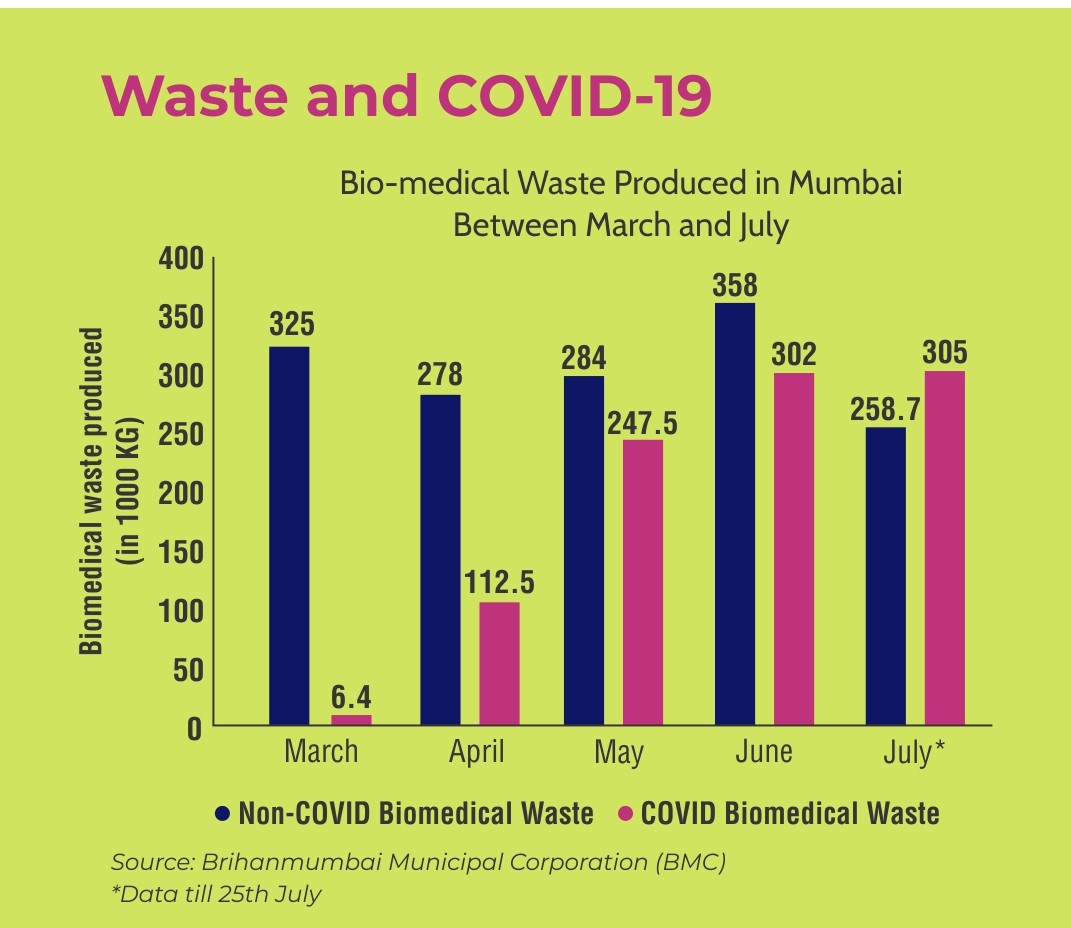August, 2020
A set of recommendations to facilitate socio-economic provisions of waste and sanitation workers in the light of COVID-19
6 minutes read
The coronavirus pandemic has been explored with an acute urgency since its advent, and one of the many things that it has been arguably called is a ‘black swan event’. A black swan event is one that is extremely unpredictable in nature, comes across as a rarity, and catches populations off-guard in their attempts of adapting to it. Doesn’t COVID-19 tick all of these characteristics? It might. Why is it then that Nassim Taleb, the man who coined this socio-statistical term rejects its association with this pandemic? He co-authored a paper that stated in January 2020 itself (while the spread of the virus was still confined to China) that this pandemic is a genuine possibility owing to our dense global network and transactions. So, this event was not all that unpredictable and hence is not a Black Swan event. This association of the term does not do much to explain how our lives came to a screeching halt. However, some populations were and continue to be more disadvantaged than the rest of us, luxuriously working from home.
This article tries to contribute to the repository of research and reports that aim to identify and analyse the working conditions and adaptations of workers who already operate along the fringes of a safe, let alone dignified workspace. Yes, we are talking about workers in the informal sector and women workers from the Waste and Sanitation industry specifically. There are 5 million sanitation workers, about 80% of them being women which makes it imperative to ensure that their unique concerns are recognized and addressed. Read on to know ways in which we can try and make secure the working conditions in this industry by ensuring that certain basic standards of socioeconomic provisions are met, specifically for the women employees here.

We didn’t need a global pandemic to push these populations at the very margins of society, at least in the Indian context
The pandemic has disproportionately affected this group of workers as they have not even been provided with basic PPE kits or steady insurance to rely on. Other intangible disadvantages include the stigma with which people perceive these frontline workers who don’t fail to show up to work and pick up our waste. The fact that these workers often come from densely populated neighborhoods becomes yet another reason to discriminate against them, limit their access to our gated housing societies and deprive them of their (often) sole source of livelihood. Their caste, class, and geographical locations become active facets along which we give ourselves the right to determine their standard of hygiene and take a step further to normalize this discrimination along ‘hygiene’ lines. Come to think of it, these are not new ideas. These workers haven’t reached this status in society on the emergence of a pandemic. We didn’t need a global pandemic to push these populations at the very margins of society, at least in the Indian context, where strict historical caste and class lines have operated since time immemorial to ensure that this system continues to prevail even in the 21st century. Why is it that this group of workers is never provided with a dignified, safe, and humane work environment?

This question led us to enlist the following recommendations that need some attention from policy-makers to ensure a safer, more inclusive world for all:
- A recovery fund needs to be set up for these employees so that they can avail this fund and are not left to fend for themselves with 0 security at usual job expectations, especially during such crises. Insurance that covers the members of the family and the worker is important. Medi-claim would provide them with regular check-ups whenever they require as their job demands close contact with toxic substances and environments. This will reduce their future lump-sum costs against testing and ensure their physical wellbeing. Microinsurance becomes crucial because illness leads to loss of wages. This can be done for groups with homogeneous preferences so that the risk involved can be shared and addressed at a community-level.
- Central as well as State governments, must invest in this sector to facilitate and legitimize large-scale improvement. The Union Cabinet approved a total investment of $20 billion for Swachh Bharat Mission (Grameen). This includes incentives for Solid and Liquid Waste Management (SLWM) infrastructure, household and community toilets, and other administrative expenses. The Government of India has formed Swachh Bharat Kosh so that private companies can contribute to this program. One of the primary provisions is that of durable safety gear that must be provided adequately from time to time to ensure basic safety and dignity of labour.
- CSR policies by private players can include ways in which funds are redistributed or investment is facilitated for upskilling workers and/or mechanizing the process of waste management as that could be a lucrative, sustainable, and empowering alternative as well.
- In the light of COVID-19, sanitation workers must be provided with regular check-ups and testing and self-isolation arrangements as per their requirements. Awareness and safety training programs must be organized for sanitation workers.
- The mental health of women from this industry is seldom taken into account. Since many of them come from marginalized communities, they may face certain mental health issues pertaining to the uniqueness of their context. Therefore, it is essential that we try to provide them with some mental health aid, for them to voice their problems in a safe space where they can be heard and their concerns made visible in the company of mental health practitioners.
- Creation of new employment opportunities; this is a goal that should be facilitated by both public and private players as this would aid in uplifting the socio-economic statuses of the concerned employees while expanding their choice circle for employment as well.
- The participation of women from within the industry in the planning committee would play a vital role as they would understand women workers better. Within the industry, as well, the participation of women in workers’ unions is of utmost importance to represent the unique demands of women from the industry. Their involvement in the decision-making process is fundamental to ensure that grievances are addressed.
- Awareness among the workers concerning economic and social benefits available to them is a must. Payslips must be provided and deductions concerning Employment Provident Fund, Society Funds, etc. must be mentioned. Often, workers fail to avail of the provisions due to a huge information gap, therefore awareness drives and programs are a crucial aspect of realizing the aforementioned recommendations.
- More than anything else, we as responsible citizens must hold our local authorities accountable and elect our representatives in a sensible manner.
Change begins at home and these recommendations are just prompted to provoke thought so as to ensure a safe and healthy work environment, both physically and mentally for these workers who are not given a lot of choice when entering this profession. The idea is to begin this conversation, act on it, raise concerns, and direct attention to these grave issues that are in urgent need of policy intervention so as to break this intergenerational vicious cycle of work.
References
- The New Yorker: The Pandemic Isn’t a Black Swan but a Portent of a More Fragile Global System, 2020
- IDR: How can we support sanitation workers during COVID-19?, 2020
- Scroll.in: COVID-19: How India can ensure that women in the informal sector get the protection they deserve, 2020
- FINISH Society: Deepening Financial Inclusion, n.d
- KPMG: Potential Impact of COVID-19 on the Indian Sanitation system, 2020

Leave A Comment